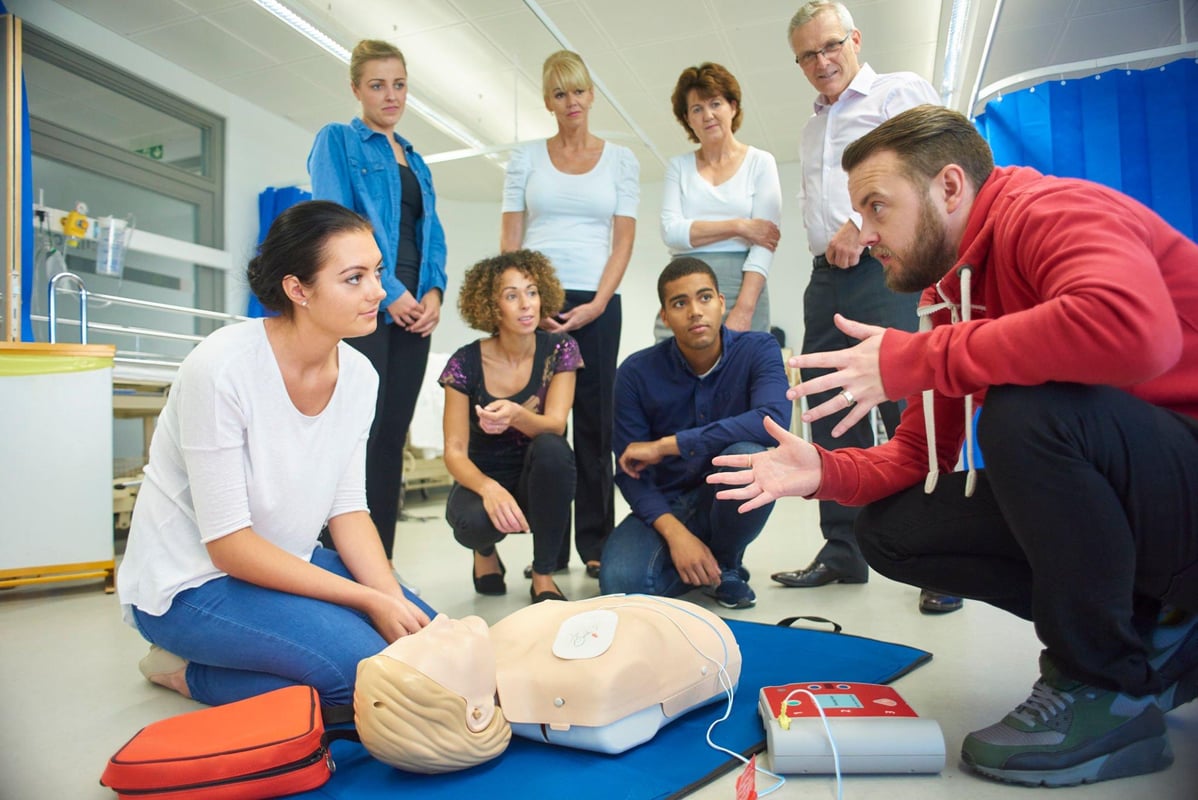
Financial aid (may be available)

Financial aid (may be available)

Financial aid (may be available)

Financial aid (may be available)
No cost info
$50 total
No cost info
$61 total
$85 total
No cost info
No cost info
No cost info
No cost info
No cost info
First Aid training is an essential skill that everyone should consider learning. Not only does it provide you with the knowledge to assist in emergency situations, but it also opens up various vocational opportunities in the healthcare sector. This blog post will guide you through the process of finding First Aid classes in Washington and provide you with a comprehensive understanding of what to expect from these classes.

First Aid is the immediate care given to an injured or sick individual before professional medical assistance arrives. It can include a range of actions, from bandaging a wound to performing CPR. The goal of First Aid is to preserve life, prevent further harm, and promote recovery.
Learning First Aid is not just for healthcare professionals. It's a valuable life skill that can be applied in a variety of situations, from minor injuries at home to life-threatening emergencies.
The training requirements for First Aid can vary depending on the organization providing the course. However, there are a few common components you should expect:
Basic understanding of human anatomy and physiology
Knowledge of common injuries and illnesses
Skills in performing basic life-saving procedures, like CPR
Training in the use of an Automated External Defibrillator (AED)
When searching for First Aid classes, it's essential to consider the following:
Accreditation: Ensure the course is accredited by a recognized national or international body.
Course Content: Check the course covers all the necessary topics to ensure a comprehensive learning experience.
Practical Training: Practical training is essential for honing First Aid skills. Make sure the course includes hands-on training.
Qualified Instructors: Look for courses taught by instructors with a background in healthcare or emergency response.
First Aid classes typically include a mix of theoretical instruction and practical exercises. You can expect to learn about:
The principles of First Aid and the role of a First Aider
How to assess an emergency situation and prioritize treatment
How to perform CPR and use an AED
How to treat a variety of injuries and medical conditions
Once you've completed your First Aid training, you'll likely need to pass an examination to become certified. The format of this exam can vary, but it typically involves a written test and a practical assessment. Once you pass, you'll receive a certificate that confirms your competence in First Aid.
First Aid certification can open up a range of job opportunities in Washington. Potential roles could include working as a lifeguard, a fitness instructor, or a childcare provider. Additionally, many healthcare roles require First Aid certification as a prerequisite. You can find related job opportunities on Dreambound.com, which is a large platform for students to find vocational training programs.
Once you've completed your First Aid training, there are several other related classes you might consider. These could include:
Advanced First Aid or Wilderness First Aid: These courses cover more complex scenarios that might arise in remote or challenging environments.
CPR/AED Certification: While this is often included in First Aid courses, you might want to take a specialist course to further refine these skills.
Emergency Medical Technician (EMT) Training: This is a more in-depth course that can lead to a career in emergency medicine.
First Aid is a valuable skill that can benefit you in many ways. Whether you're looking to enhance your resume, prepare for a career in healthcare, or simply be prepared for emergencies, First Aid training is a worthwhile investment. Remember to choose an accredited course taught by qualified professionals, and use Dreambound as a resource for finding related vocational training programs and job opportunities in Washington.
By taking the time to learn First Aid, you're not only investing in your future you're also equipping yourself with the knowledge to potentially save a life. Whether you're a student, a parent, a teacher, or a professional, First Aid is a skill that everyone should have.
How to Become a Pharmacy Technician in the District of Columbia
How to Become a Respiratory Therapist in the District of Columbia
With Dreambound, find comprehensive guides that make starting in this field easier, each suited to a specific city. If you've planned a move or are doing research for another vocation, our other guides may be able to help.
Contemplating a transition in your career or exploring various professional paths? Dreambound has written many guides to help you in making informed decisions. Here are a few:
Dreambound's platform allows prospective students to find the right educational program for them through searching, filtering, and connecting with our extensive selection of career & technical education partners.
Dreambound has over 70 programs across healthcare, technology, business, and industrial trades. This includes programs such as Medical Billing, Cybersecurity, and welding.
Some of our schools offer financial aid for those who qualify. Many others offer payment plans, where you can pay the cost of class over time.
Yes, Dreambound offers many online programs. On Dreambound's search, you can filter by online, in-person, and hybrid (part online, part in-person).
Dreambound is completely free for you to use! We are supported by schools and organizations who pay to advertise on our website, so we can offer all of our career resources for free.